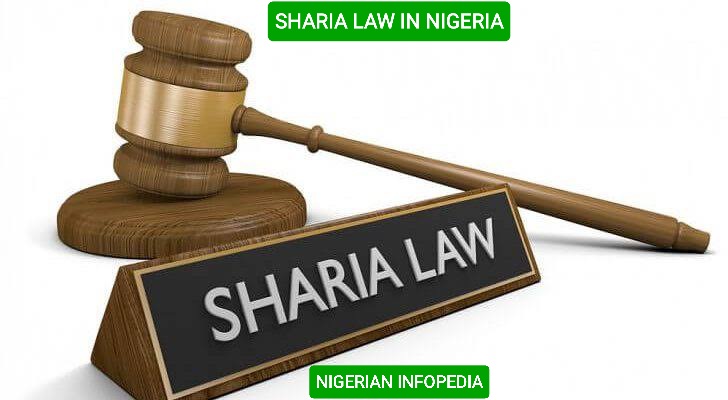Full List of Sharia States in Nigeria
Sharia law has been a significant part of Nigeria’s legal system in twelve Muslim-majority states since 1999. While it primarily governs personal status matters such as marriage, divorce, and inheritance, the rest of the legal system remains secular.

However, the implementation of Sharia has faced criticism for infringing on religious freedom as guaranteed by the Nigerian constitution.
These states with Sharia law also have Hisbah groups, which emphasize Islamic virtue and discourage vice. However, these Hisbah groups have been known to administer punishments without proper law enforcement procedures, sparking comparisons to vigilante groups.
Additionally, certain activities such as playing music, homosexuality, and alcohol consumption are considered violations of Sharia.
This implementation of Sharia has led to conflicts and protests, particularly among non-muslim minorities. Notable cases such as Amina Lawal’s and Safiya Hussaini’s have raised concerns about the fairness of Sharia in Nigeria.
OVERVIEW OF SHARIA LAW IN NIGERIA
Sharia law has been instituted as the main body of civil and criminal law in twelve Muslim-majority states in Nigeria since 1999. While it primarily applies in personal status issues such as marriage, divorce, inheritance, and child custody, the legal system remains secular in other matters. This implementation of Sharia law has faced criticism for violating religious freedom guaranteed by the Nigerian constitution.
In the twelve states with Sharia law, it functions alongside Customary courts, with each state having its own unique Hisbah group. Sharia courts are responsible for interpreting and enforcing Islamic law, while Customary courts handle traditional and cultural issues. This dual legal system aims to cater to the diverse religious and cultural landscape of Nigeria.
The implementation of Sharia law has received substantial criticism from various quarters. One major concern is the violation of religious freedom, as non-Muslims and minority Muslim sects often face discrimination under the Sharia legal system. Critics argue that the state’s endorsement of one religion over others undermines the principles of a secular democracy. Additionally, the harsh punishments prescribed by Sharia, such as amputations and stoning, have been condemned as cruel and inhumane by human rights organizations and the international community.
LIST OF STATES WITH SHARIA LAW IN NIGERIA
Twelve out of Nigeria’s thirty-six states have Islam as the dominant religion, and they have implemented Sharia law. These states are primarily located in the northern region of the country. The introduction of Sharia law in these states was a response to demands from the Muslim populace to have their legal system aligned with their religious beliefs.
As of 2021, the following Nigerian states had implemented Sharia law in some form:
- Zamfara State: Zamfara State was one of the first states in Nigeria to adopt Sharia law in 1999. The state government has implemented Sharia law, which covers various aspects of daily life, including criminal justice, family law, and public conduct.
- Kano State: Kano State is known for its strict adherence to Sharia law. The state has established Sharia courts to handle cases related to Islamic law, such as family disputes and Islamic finance matters.
- Sokoto State: Sharia law has been implemented in Sokoto State since 2000. The state’s Sharia courts handle cases involving Islamic law, and there is a Sharia police force responsible for enforcing moral and religious codes.
- Kebbi State: Kebbi State has implemented Sharia law to some extent, mainly focusing on Islamic family law and morality issues.
- Katsina State: Katsina State has Sharia courts to address matters related to Islamic law, including family disputes and inheritance.
- Niger State: Sharia law was introduced in Niger State in 2000. The state has Sharia courts and enforces Islamic law, particularly in family and personal matters.
- Bauchi State: Bauchi State implemented Sharia law in 2001. Sharia courts handle various cases based on Islamic law, including marriage, divorce, and inheritance.
- Borno State: Sharia law has been enforced in Borno State since 2000. The state has established Sharia courts, and Islamic law plays a role in family and criminal matters.
- Jigawa State: Jigawa State has Sharia courts and has implemented Islamic law, primarily focusing on family and moral issues.
- Yobe State: Yobe State introduced Sharia law in 2000. Sharia courts handle cases related to Islamic law, and there is an emphasis on religious and moral conduct.
- Kaduna State: While Kaduna State as a whole did not fully adopt Sharia law, some local government areas within the state have implemented it. The extent and application of Sharia law vary within the state.
The dominance of Islam in these twelve states has played a significant role in the implementation of Sharia law. Muslims constitute the majority of the population in these regions, and their religious leaders have actively advocated for the adaptation of Sharia as the primary legal framework. The pressure from the Muslim community and the desire to cater to their religious sentiments has driven the establishment of Sharia law in these states.
The legal system in these states with Sharia law consists of both Sharia courts and Customary courts. Sharia courts handle cases that fall under Islamic law, such as marriage, divorce, and inheritance. Customary courts, on the other hand, deal with traditional and cultural matters. This dual legal system allows for the accommodation of both religious and customary practices in the legal framework of these states.
HISBAH IN NIGERIA
Each state that has implemented Sharia law in Nigeria has its own Hisbah group. Hisbah aims to promote Islamic virtue and discourage vice within the Muslim community. The group’s activities are akin to those of vigilante groups and are primarily focused on enforcing Sharia requirements.
Hisbah has been involved in various activities deemed necessary for upholding Islamic values. They monitor and enforce dress codes, restrict the playing of music, combat homosexuality, and discourage practices such as alcohol consumption and certain hairstyles that are considered violations of Sharia law. Hisbah members often conduct patrols to ensure compliance with Islamic norms and are authorized to make arrests and enforce punishments.
Hisbah’s activities have drawn criticism for their vigilantism and disregard for proper law enforcement procedures. The group has been accused of taking the law into its own hands, bypassing the formal legal system and administering punishments without due process. Human rights organizations have raised concerns about the infringement of individual rights and the potential for abuse of power by Hisbah members.
OFFENSES UNDER SHARIA LAW
Here are some offences punishable under Sharia law in Nigeria.
BLASPHEMY
Blasphemy is considered a criminal offense under both civil and Sharia law in Nigeria. Under Sharia law, blasphemy is seen as an act that insults or defames Islam or its Prophet Muhammad. Penalties for blasphemy in Sharia courts can range from fines to severe punishments such as amputations, floggings, or even death.
OTHER VIOLATIONS
Apart from blasphemy, Sharia law also penalizes various other offenses. These include adultery, theft, homosexuality, and drinking alcohol. Violators may face punishments such as public floggings, amputations, or imprisonment. However, it is important to note that the severity of punishments and their enforcement varies between different states and even within different Sharia courts.
DEATH SENTENCES IN SHARIA LAWS IN NIGERIA
Despite the imposition of Sharia law in twelve states, the number of death sentences handed down by Sharia courts has been relatively low. Since 1999, only one death sentence has been carried out in accordance with Sharia law. The reluctance to carry out the death penalty is partly due to national and international pressure, as well as concerns about the fairness and human rights implications of capital punishment.
The implementation of death sentences under Sharia law involves a thorough judicial process. The convicted person has the right to appeal the sentence, ensuring that their case is reviewed by higher courts. Additionally, the Nigerian constitution recognizes the right to life, making it challenging for Sharia courts to carry out the death penalty without facing legal challenges or public scrutiny.
ROLE OF SHARIA COURT OF APPEALS
The Sharia Court of Appeals in Nigeria plays a crucial role in interpreting and reviewing cases involving Sharia law. It acts as the highest judicial authority for matters related to Islamic law and is responsible for ensuring the consistency and legitimacy of Sharia decisions. In addition to its role in Sharia law, the Court controversially deals with common and customary laws as well, leading to concerns about the erosion of secular principles.
The dual role of the Sharia Court of Appeals in interpreting both Sharia and common laws has raised controversies. Critics argue that this compromises the independence and impartiality of the court, as it may favor Islamic interpretations over secular ones. Moreover, the Court’s jurisdiction over non-Sharia matters has led to concerns about the gradual dilution of the secular legal system in favor of Islamic law.
CONCLUSION
The implementation of Sharia law in twelve states of Nigeria has been a subject of controversy and debate. While it aims to cater to the religious beliefs and values of the Muslim population, it has faced criticism for encroaching on religious freedom and human rights.
The presence of Hisbah and the enforcement of Sharia requirements have raised concerns about vigilantism and abuse of power.
Notable cases like Amina Lawal’s and Safiya Hussaini’s have shed light on the complexities and flaws within the Sharia legal system, calling for a comprehensive examination of its principles and implementation.
The future of Sharia law in Nigeria remains a contentious issue, as the country strives to balance the demands of its diverse population and the principles of democracy and human rights.

